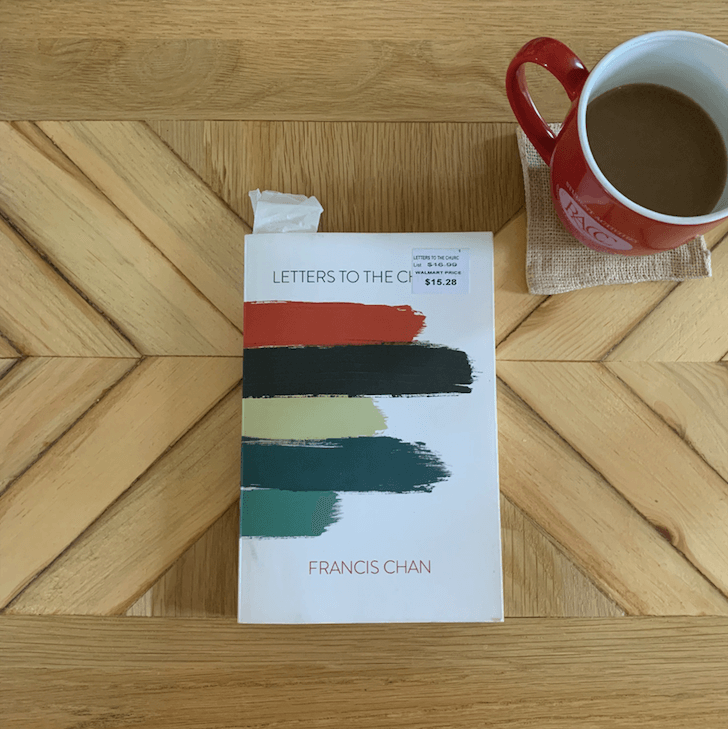Letters To The Church by Francis Chan was looked at as a slightly controversial book when it was released. It poses the following premise: If the church did not exist today and we were to open the Bible and create the church based on what it says and teaches, what would it look like?
Whoa! Such an interesting concept, and what a great question that we should pose to ourselves as we go to church, as we serve, and as church leaders. Personally, I feel like any controversy that arose from this book being published was rooted in people that only read the first chapter and did not finish the book. The presentation of that stark concept is gripping and makes believers slightly uncomfortable. As it should. We should be reflecting on how we do things and ask ourselves, “Is this God’s will, or is it my will, my culture, my habits, and just what I am used to?”
How To Read Letters To The Church
When I started reading Letters to the Church, I read it incorrectly. I dove into it thinking about my church experience, past and present churches and how they messed up. This was prideful and wrong of me! When reading this book, we need to remove that perspective from our minds. We need to read Letters to Th and think, “How can I improve in a way that will make my church just one person closer to the church as God wants it to be, not the church I want it to be.”
When I realized how I was reading Letters to The Church, it revealed pride in me that I did not know was there, and I had to ask forgiveness for that. So that is my warning to you. Read this book with humility, and of course, read through the New Testament and study what God says about the Church. Because this book is basically a commentary on the Bible. You can learn from this book, but you should really go to the source of our knowledge about God and the church.
 The Focus of Letters to The Church
The Focus of Letters to The Church
The premise presented is what the church would look like if we just used the Bible as an instruction manual, but what does the book focus on? Truly it takes the teachings of Crazy Love and applies it to a community setting. It is the Crazy Love of fellowship with other Christians.
The Opening of Letters to The Church
The opening chapters call out the present-day churches and how they have become a community rooted in culture rather than Christ. Rather than making Christ the center of the church we are making events, culture, traditions, and entertainment our core. Newer churches are looking to create an experience and a form of entertainment. In contrast, other churches are focusing on culture and history. Just imagine an old guy saying, “We do it this way because that is how we have always done it, so it must be the correct way.” Both of these approaches are unhealthy and results in the church being distracted. We need to come to the realization that God and Christ’s sacrifice is awe-inspiring, real and way better than any flashy lights or traditional music. He is why we sing praise, it is not just for us. What Francis Chan then looks at is the result of this problem.
People are no longer amazed by God. Rather than something real, we want to watch a movie and get our quick fix. The book takes time to remind us of how amazing, great and powerful God is, and how us being saved by Him should change everything in our spiritual lives! This is such a great reminder as we dive into the meat of the book.
The Meat (Middle) of Letters to The Church
This is where you will need to do a lot of self-reflection. Some quick takeaways. It is not about you. Don’t just go to church to consume, but rather to serve and grow. Consumers are miserable. Contributors are joyful. Think to yourself, if you go to church simply to get your daily dose of the bible to make it through another week, and you don’t have time or energy to give to God, why would he give you time or energy. Parents, if your kid was only ever nice or spent time with you when they wanted gas money, what would you do? Or, what should you do? You would discipline them in a way that teaches respect and results in their growth so this childish behavior does not continue.
Are we just overgrown children living in God’s basement trying to do whatever makes us feel good while also trying to reap the benefits of God’s grace?
This is my own takeaway and analogy of the book. I just wanted to let you know because I’m pretty proud of coming up with it.
So what Letters to the Church presents are ways we can grow and improve so that our church can be what God wills it to be, rather than what we will it to be.
Another area that I thoroughly enjoy is a focus on leadership. As leaders, we guide the church and are shepherds of it. We cannot take our position lightly and must continually seek God and ask for His guidance because we are fallible human beings. One of the things Francis Chan self reflects on is how he was a great leader in his church, but he was not great at building up other leaders. What needs to be asked is, if your pastor and the elder board were to suddenly die, would your church continue to exist? If half the leaders of the church were to suddenly die, would your church step up and structure be able to fill the positions of leadership?
If the answer is no, your church probably is not the healthiest. This is because it relies too much on the leadership of a few humans and too little on the leadership and knowledge of God.
If the answer is yes, then your church is building and equipping leaders. And the congregation is willing to grow, serve and dedicate their time to giving to God, not just consuming a Sunday message.
In this area of the book, Francis Chan also presents some options on how to change your church and create large upheavals in the structure. I do not agree or disagree with what he presents, but I do question the source of these actions. The structure proposed is the one created within the church plants they started back in 2014 titled we are church. While certain structural changes might make vital changes in the mindsets of believers, I do wonder how it would be received by new believers who are still used to their old lifestyles. Essentially, how do we provide more than “milk” to believers when a large portion of the congregation still needs milk. And how do we wean believers off of milk to solids (If this analogy is weird, read 1 Corinthians 3)? I do not know. But I hope to find out as I grow as a leader in the church.
The Conclusion of Letters to the Church
I actually have not finished it yet! So you’ll have to come back and read the conclusion. Subscribe and check “faith” and I will email you once this blog post is complete!
Thanks!
My Conclusion and Final Thoughts
This will expand upon my personal application and takeaways once I complete the book.

